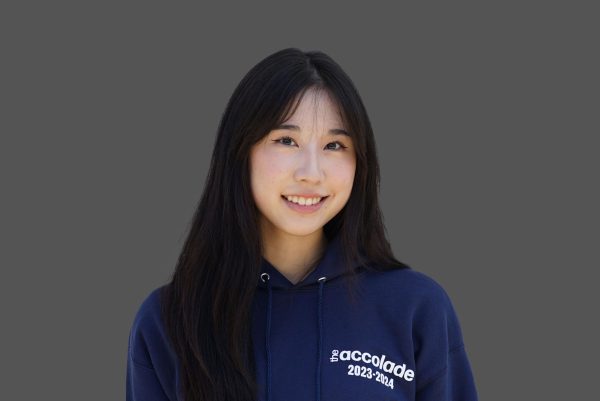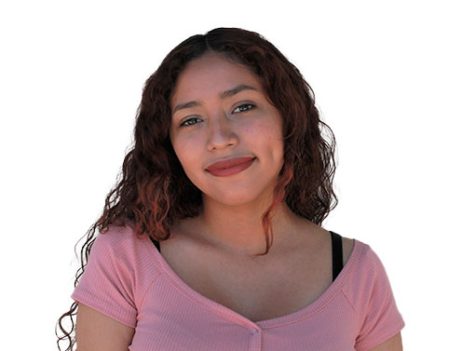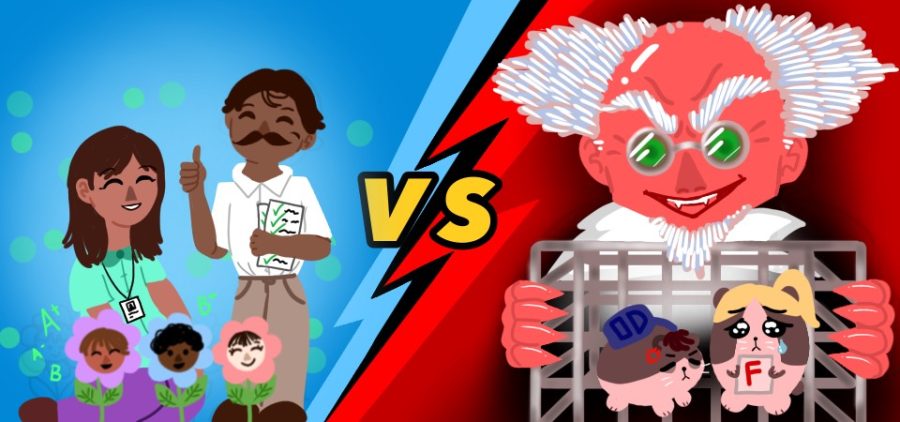An artist’s rendition of two different student teachers — one cultivating the students’ growth and the other treating them like guinea pigs.
HEAD TO HEAD: Student Teacher vs. Regular Teacher
October 26, 2022
Teachers, don’t let student teachers outshine you
As the student teacher sets up his phone to record himself educating my sophomore Algebra 2 Honors class to submit for college credit, my peers and I awkwardly unpacked the notes our teacher told us to take out to prepare for yet another lecture through the student teacher’s inexperienced teaching.
Though some students may enjoy the idea of having an extra instructor, I believe allowing only the teacher to have the spotlight and full control in the classroom would not only benefit the teacher’s sanity but also the students’ grades.
This was not my first experience with an unprepared instructor leading the classroom. My fourth grade class was also accompanied by a young student teacher, hoping to fulfill his college requirements.
Last year, I never expected that my Algebra 2 Honors class would end up being the most stressful and difficult part of my schedule. That was until a new, unfamiliar face was introduced to the class in the beginning of the second semester.
Because my student teacher never had experience with teaching prior to this class, his eyes would constantly peer over at the answer key as he lectured us. Somehow even with the help of the answer key, he would fail to coherently teach us anything.
Instead of a fresh new way of presenting the lesson plan, he attempted to follow the traditional lectures but in a completely unorganized way; he presented notes with sticky-notes plastered everywhere, and his examples were copied completely from the answer key.
So, school administrators should consider allowing student teachers to teach in a summer school setting instead, as courses are shorter and curriculums are less rigorous than a normal school year.
Most teachers who had experiences with a student teacher cohesively came across the same problem: student teachers are unable to manage students’ behavior and “would step in and model how [they] would handle things, [and] eventually let them take over,” according to proteacher.net.
On the occasions when the student teacher had the spotlight, the classroom was uncontrollably loud, with side conversations coming from every table even though the student teacher was reviewing the lesson for the day.
I recall whenever we had an upcoming quiz or test the next day, when my classmates raised their hands to ask questions, the student teacher replied, “Check the answer key.”
I couldn’t understand how our question could be answered merely by checking the answer key when what we needed was a thorough explanation.
Some may claim that incorporating student teachers into classrooms is the only way they will be prepared in the future, but this may disadvantage students and interfere with their accustomed way of learning.
Having a student teacher forced my regular teacher to stand in the back and observe as we learned absolutely nothing — this was a rare image of my teacher who prefers to micromanage everything in the classroom.
It was refreshing to have my Algebra 2 teacher step in and assist the student teacher when he was teaching because of the many times he would blank out. Instead of being a second teacher, he blended right in with the students.
Just like the rest of us, he was being tested and graded, as well as being supervised by our actual teacher. He lacked the qualities of a true educator, in that he had no dependability or ability to conduct a proper class session.
Thus, the teaching credential system should find other ways to see how well future teachers will perform in classroom settings without using students as their guinea pigs.

Outside of The Accolade, Kim participates in various clubs and organizations such as the California Association of Student Councils and Cooperation Act. She also enjoys creating playlists, taking naps and eating Korean food.
Learning from experience: student teaching cultivates better teachers
“Good morning, class.”
That was the greeting I had grown accustomed to three years ago whenever I walked into my freshman World History class. Yet this time, in February, a fresh, new tone welcomed me.
At the front of the classroom stood a different adult from the one whom I was used to seeing – this was the face of the individual I had only seen sitting in the back of the classroom for the first semester: my student teacher, let me refer to him as “Mr. J.”
Radiating confidence, he quickly took control of the noise in the room and began talking as if it was as if he’s been in the education field for decades. In contrast to the old-fashioned lectures my original history teacher utilized, Mr. J made his instruction interactive; he presented personal examples, connected historical lessons to the present day and even successfully made the class participate.
I’ll never forget that one time when we were discussing the events of World War II, and instead of just presenting a PowerPoint presentation he showed multiple videos about the ending of the war. The next day, instead of just moving on with the material, there was a question presented to us: Was the Atomic Bombing of Hiroshima justified? This inquiry caused an uproar in the room as everyone presented their own opinions and debated their side; I had never seen such participation in my class.
Previously, I had three student teachers before my freshman year; now, as a senior, I have had a total of one student teacher during my high school experience – Mr. J. Therefore, our school should encourage the inclusion of the teaching credential program that includes the student teaching component on campus as they mutually benefit both students and teachers while honing their skills.
Because of the age difference, teachers tend to lose track of relevant topics and beliefs important to teenagers, so having student teachers in classrooms actively engaging with the material promotes the inclusion of different, modern approaches to a curriculum that builds a connection between the students and the subject.
In my case, world history became more than just memorizing dates and names — it became an opportunity for me to learn a new perspective on the importance of the subject in the modern day. Going back to the Hiroshima discussion, such a heavy question made me realize the weight history has in our present day. Every past action has a lasting effect on society.
As a result, I noticed my classmates and I wanted to participate more in class: we talked in group discussions, contributed to class conversations and answered questions.
Such changes resulted in my actual teacher to start incorporating some of Mr. J’s ideas into his teachings once he took over the classroom again, such as showing more videos and posting the notes online to accommodate in-class discussions.
Critics of my argument may claim that student teachers are unable to manage students because of the constant need for the regular teacher; however, this is the only way to train them for their future job.
According to a November 2020 online article posted on the National Council on Teacher Quality website, when student teachers work with effective teachers, student learning will not be disrupted. Therefore, instead of simply labeling them as a distraction, experienced teachers should work to establish a professional, productive relationship with their student teachers that promotes growth through critique and communication.
Similarly, students should carry a proactive attitude in which they ask questions to make the experience beneficial to both parties.
Additionally, student teachers should not be held accountable for the classes’ full academic understanding of the curriculum; the original teacher should intervene to ensure the material makes sense to the classroom. Student teaching serves as the gateway to mold future great teachers and thus should be seen more in classrooms at our school.

When not working for The Accolade, you can find her leading other school clubs, watching Netflix or hanging out with friends.

